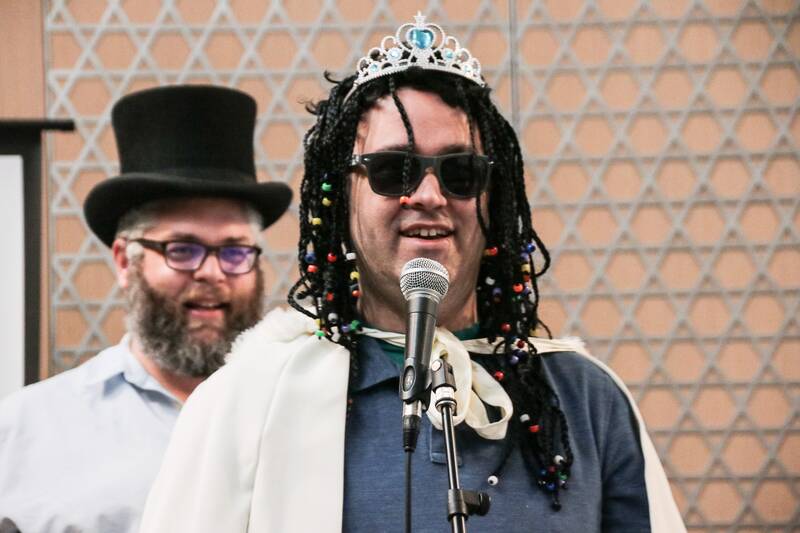November 2023 Rabbi's Article
| Author | |
| Date Added | |
| Automatically create summary | |
| Summary |
Simchat Torah 5784 @ Kol Rinah
I write this in the middle of October, Hamas’s horrific assault on Israel is ten days in the past. As you know, it occurred on Shabbat which was also Shemini Atzeret (and in Israel, Simchat Torah too). Shemini Atzeret (the 8th day of Sukkot), and Simchat Torah, an extra day after that, are known as zman simchateinu, the season of our rejoicing—two of the happiest days on the Jewish calendar.
For your curiosity, or interest, and maybe for posterity, I want to remember how we observed Simchat Torah this year, amidst so much sadness, horror, mourning, fear, and uncertainty.
Saturday night we had a small group for erev Simchat Torah, as we had focused our efforts on celebrating Simchat Torah on Sunday morning.
I led maariv, and just used the regular festival evening nusach (melody), instead of being sillier, as we often are, on Simchat Torah. For the hakafot (circles), we walked Torahs around the sanctuary. There was no dancing to speak of. We sang one song for each hakafah, slow songs appropriate for the circumstances, including Am Yisrael Chai (the people Israel lives), Esa Einai (I will lift up my eyes to the hills), Lo Yisa Goy (nation shall not lift up sword against nation), Hatikvah, and L’shana Haba’a Birushalayim (next year in Jerusalem).
The next morning, with many families and kids in attendance, as well as Will Soll on guitar and a violinist friend of his there, we needed to decide how festive to make the hakafot.
Shacharit and Hallel (led by Rabbi Shafrin) were normal-ish, for a regular holiday, although not festive as one would expect for Simchat Torah. Per Will Soll’s thoughtful suggestion, the first hakafah was silent, as we all walked, with the Torahs, slowly around the sanctuary. The next few hakafot were similar to the previous night—one song each (similar list of songs), no dancing. For one hakafah, Will and his friend played a kind of mournful dance, which we listened to as we walked.
For the seventh and final hakafah, we let loose, again with L’shana Haba’a Birushalayim, and musical accompaniment, and we really danced.
I know some people were itching to dance sooner. I know others who, too upset, couldn’t come in to the sanctuary, or who couldn’t even bring themselves to shul.
We found, I think, a way to make it feel like Simchat Torah, amidst a time of mourning, a time of shock.
May we never need to use this playbook again.
Tue, May 7 2024
29 Nisan 5784
MISSION: Create a welcoming community that embraces Torah, meaningful worship, lifelong learning, music, Israel, and tikkun olam, guided by the tenets of Conservative Judaism.
Calendar & Services
Weekday minyans on Zoom:
Mornings- M, T, W, F 7am & Sun 8am.
Evenings- Sun-Th 6pm.
Log in to view the Zoom Links page.
Thursday mornings 7am are in-person only.
Shabbat services in-person, streaming.
To stream kolrinahstl.org/kr-streaming
Office Hours
Monday – Thursday 9am to 5pm
Friday 9am – 3pm
Phone: 314-727-1747
Friday 9am – 3pm
Phone: 314-727-1747
Today's Calendar
: 7:00am |
: 6:00pm |
: 7:00pm |
Upcoming Programs & Events
May 11 |
May 11 |
May 12 |
May 15 |
May 18 |
This week's Torah portion is Parshat Kedoshim
| Shabbat, May 11 |
Candle Lighting
| Friday, May 10, 7:45pm |
Havdalah
| Motzei Shabbat, May 11, 8:49pm |
Rosh Chodesh Iyyar
| Wednesday, May 8 |
Find it at Kol Rinah
Reserve/Purchase
- Memorial Plaques or Header
Shavua Tov
Contribute to a Shabbat Kiddush
Celebrate life-cycle events or honor a loved one. A Shabbat Kiddush is a beautiful way of sharing a moment with the community!
Want to sponsor a specific Kiddush? Contact Barbara Shamir,
Event Request
FAQ's
Tue, May 7 2024 29 Nisan 5784




